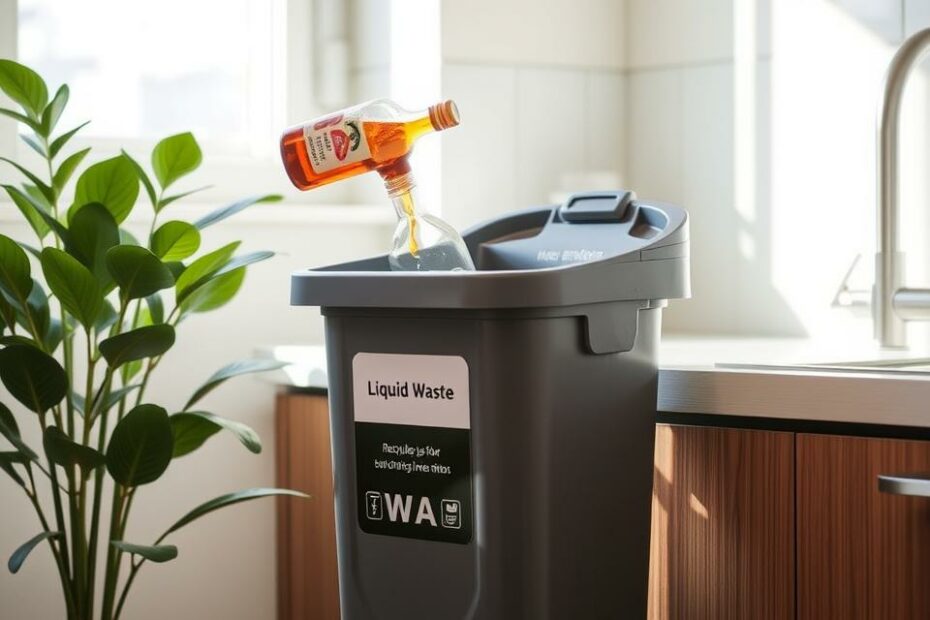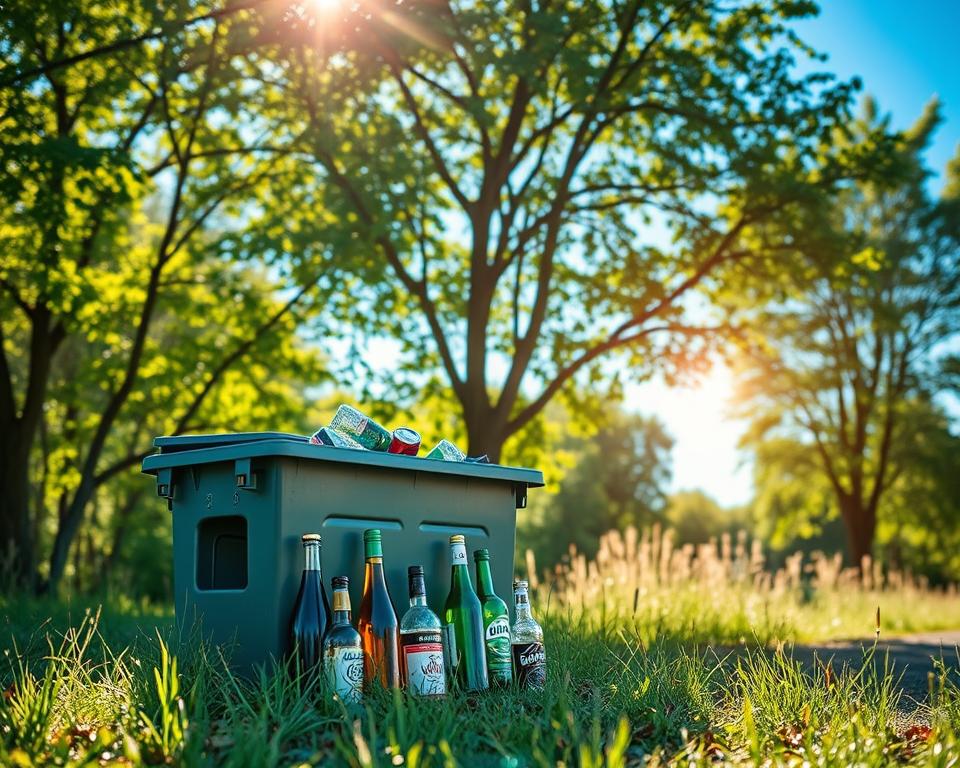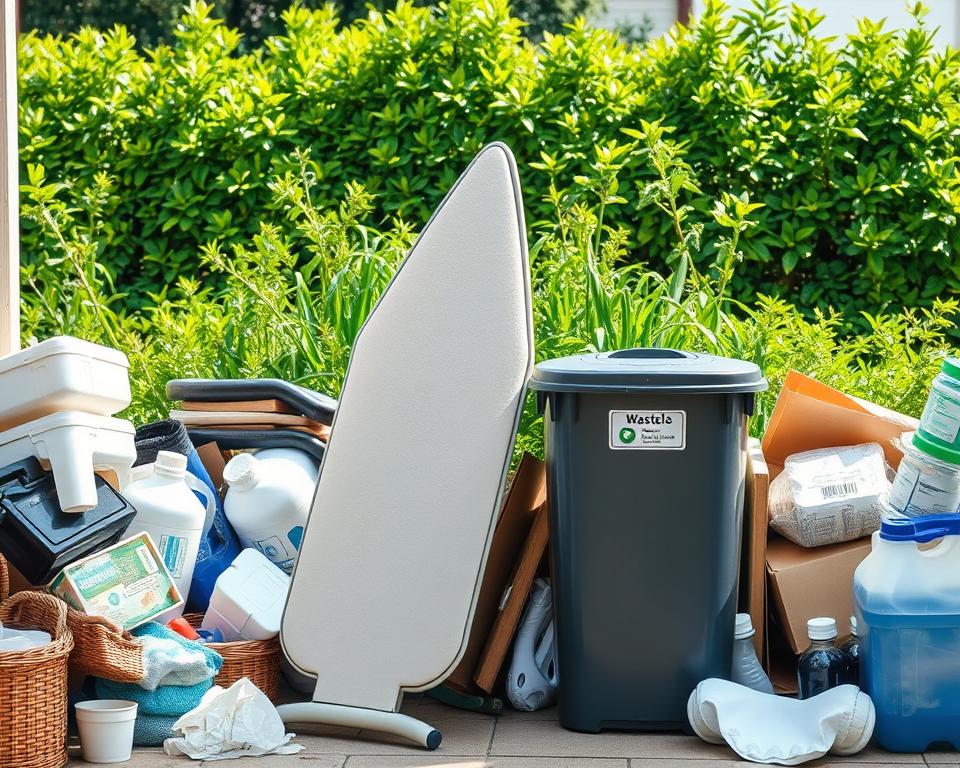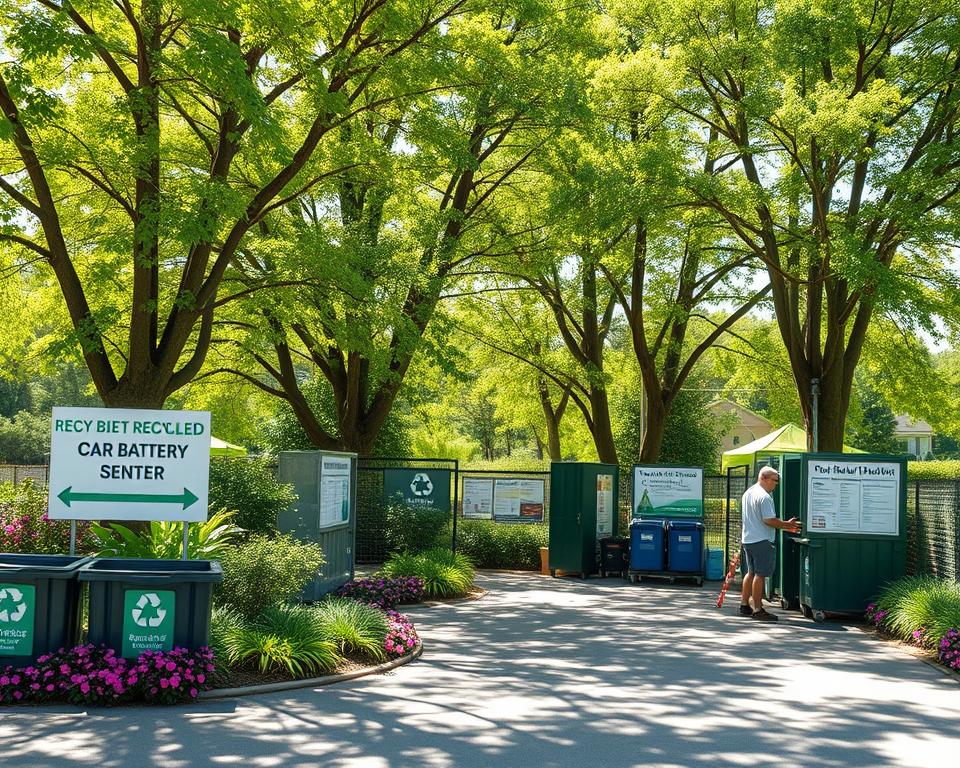In today’s world, taking care of waste is key. This includes how we dispose of alcohol and related items. Places like hospitals and cleaning services need to know how to handle alcohol waste right. This knowledge helps protect our environment and avoids legal trouble.
But do you know the best ways to dispose of alcohol safely and sustainably? Our guide will show you how to manage alcohol waste responsibly. You’ll learn about the benefits of a good waste management plan.
Key Takeaways
- Proper disposal of alcohol is essential for environmental and legal compliance.
- There are various types of alcohol, each requiring specific disposal methods.
- Dilution and recycling are preferred disposal methods for smaller quantities.
- Hazardous waste facilities are necessary for larger volumes or higher concentrations.
- Implementing a professional alcohol disposal service can save time, money, and environmental impact.
Introduction
If you have alcohol products past their sell-by date, it’s key to dispose of them right. This is to keep your employees, the environment, and your community safe. We’ll cover the three main types of non-merchantable alcohol and how to get rid of them properly.
Importance of Proper Alcohol Disposal
Throwing away alcohol the wrong way can harm the environment, public health, and lead to legal trouble. It’s vital to dispose of hazardous alcohol waste and liquid alcohol waste responsibly. This helps avoid these dangers and lessens the harm to our planet.
Overview of Alcohol Types and Disposal Methods
There are three main types of non-merchantable alcohol that need special care:
- Rubbing alcohol – a type of alcohol waste that can be flammable and toxic if not disposed of properly
- Spoiled alcohol beverages – alcoholic drinks that have gone bad and can no longer be consumed
- Denatured alcohol – a type of alcohol waste that has been treated with additives to make it unfit for drinking
Each type of alcohol needs its own alcohol waste management and proper alcohol disposal procedures. This ensures safety for the environment and follows the law. The next sections will explore the specific ways to handle and dispose of each type of non-merchantable alcohol.
Rubbing Alcohol Disposal
Rubbing alcohol, also known as isopropyl alcohol, is used for cleaning and disinfecting. But, it’s flammable and hazardous, so it needs careful handling and disposal. If not disposed of properly, it can harm the environment and pose safety risks.
Hazards and Precautions
Rubbing alcohol has 70% to 90% ethanol and is considered hazardous. Its fumes can be dangerous to breathe in and can harm the lungs. Also, it’s very flammable, so it’s important to handle it with care and avoid fire or high heat.
Disposal Methods for Small and Large Quantities
- Small Quantities: You can dilute rubbing alcohol with water and pour it down the sink. But, make sure it’s not more than 2 bottles.
- Large Quantities: For bigger amounts, take it to a hazardous waste disposal facility. This ensures it’s handled and disposed of safely.
For large amounts, check with local waste management to know the rules in your area. Some places have special drop-off locations or events for hazardous waste like rubbing alcohol.
It’s important to handle and dispose of rubbing alcohol properly. This protects the environment and keeps your home safe. By following the right steps, you can reduce the risks of this flammable and hazardous liquid.
Disposal of Spoiled Alcohol Beverages
Handling spoiled alcohol is key for companies and distributors. Spoiled alcohol can’t be drunk because of contamination, expiration, or long storage. Small amounts of water-diluted alcohol can go down the drain. But, big amounts can harm local waterways if not disposed of right.
Companies and distributors must dispose of expired alcohol safely. This includes empty and full containers, and beer kegs. Not doing so can pollute the environment and lead to big fines.
| Disposal Threshold for Alcohol Beverages | Disposal Method |
|---|---|
| Beer: 2,500 gallons or less | Destruction without CDTFA supervision |
| Still Wine: 2,500 gallons or less | Destruction without CDTFA supervision |
| Sparkling Wine: 1,500 gallons or less | Destruction without CDTFA supervision |
| Quantities exceeding thresholds | Destruction under CDTFA supervision |
Destroying spoiled alcohol needs careful records and reports, as shown in the CDTFA-775 form. The process might need a CDTFA person’s help, which can take up to 12 business days.
Following the right expired alcohol disposal, contaminated alcohol disposal, and spoiled beverage disposal steps helps companies. They stay in line with laws, reduce harm to the environment, and improve their alcohol waste management.
Denatured Alcohol Disposal
Denatured alcohol is a type of alcohol mixed with chemicals, making it unsafe for drinking. It’s used in products like antifreeze, paint thinners, and nail polish remover. When it’s time to get rid of denatured alcohol, it’s important to handle and contain it correctly.
Handling and Containment Procedures
Denatured alcohol is toxic and flammable, so it needs careful handling. Never pour it down the drain or into a sink or toilet. It can harm the environment and water supplies. Instead, put it in a sealable, leak-proof container for safe disposal.
When working with denatured alcohol, especially in large amounts, good ventilation is key. This prevents flammable vapors from building up. Always wear protective gear, like chemically resistant gloves, to avoid skin contact or accidental ingestion.
Transportation and Disposal Guidelines
After containing the denatured alcohol, follow local rules for hazardous waste disposal. Don’t try to dilute or evaporate it as a way to dispose of it. This is illegal and can harm the environment.
Reach out to your local hazardous waste service or a professional denatured alcohol disposal provider for safe and compliant disposal. Proper disposal is essential for the environment and helps prevent fires or accidental exposure.
| Hazard | Risk | Mitigation |
|---|---|---|
| Flammability | Ethanol fires can cause major property damage | Use proper containment, avoid ignition sources, ensure ventilation |
| Toxicity | Ingestion can cause headache, nausea, and intoxication | Wear protective equipment, avoid skin contact or ingestion |
| Environmental Impact | Denatured alcohol is toxic to marine life | Dispose of through approved hazardous waste channels |
Regulations and Compliance
Proper disposal of alcohol is key, whether it’s rubbing alcohol, spoiled drinks, or denatured alcohol. Knowing local laws on hazardous waste management is crucial. Businesses handling a lot of alcohol must follow all rules to avoid fines and legal trouble.
Local Laws for Hazardous Waste Disposal
States and local areas have their own rules for disposing of hazardous waste, like alcohol. Important things to remember include:
- Registration and licensing for selling spirits, wine, or beer
- Correct labeling, sealing, and keeping records of liquor sales
- Rules against refilling or reusing liquor bottles by others
- Checks on retail businesses and their liquor stock
- Penalties for not following the rules, like fines up to $10,000 and jail time up to 5 years
Besides local and state laws, federal rules under the Resource Conservation and Recovery Act (RCRA) also apply. These cover managing hazardous waste, including from alcohol products.
| Hazardous Waste Generator Category | Monthly Hazardous Waste Generation | Key Compliance Requirements |
|---|---|---|
| Large Quantity Generator (LQG) | 1,000 kg or more | Training, waste accumulation time limits, storage, manifest requirements |
| Small Quantity Generator (SQG) | More than 100 kg, less than 1,000 kg | Training, waste accumulation time limits, storage, manifest requirements |
| Very Small Quantity Generator (VSQG) | 100 kg or less | State-specific requirements may apply |
Working with experts who know alcohol disposal laws can help businesses stay compliant. This reduces their risk and liability.
Benefits of Professional Alcohol Disposal Services
Working with a professional for alcohol waste disposal has many perks. It helps your business reduce its environmental impact in big ways. A reliable service saves you time and money, avoiding the dangers of improper disposal.
Environmental Impact Reduction
Choosing a professional for alcohol recycling is good for the planet. These services use advanced methods to handle waste safely. This keeps our environment clean and reduces your business’s footprint.
Cost Savings and Risk Mitigation
Using a professional for alcohol disposal saves you money. It also keeps your business safe from fines and accidents. This is because they follow strict, safe handling practices.
| Benefit | Description |
|---|---|
| Environmental Impact Reduction | Environmentally responsible alcohol recycling helps protect the local ecosystem and reduce your overall environmental footprint. |
| Cost Savings | Cost-effective alcohol disposal allows you to avoid fees and fines associated with mishandling hazardous waste. |
| Risk Mitigation | Secure disposal solutions protect your business against the risks of unsafe handling practices, reducing the potential for accidents, injuries, and environmental damage. |
Partnering with a professional alcohol disposal service brings many benefits. Your business will be more environmentally friendly, save money, and be safer. Plus, your alcohol waste will be handled correctly and safely.
Disposal of alcohol
Disposing of alcohol-based products needs careful and green waste management. Whether you have a little or a lot of alcohol waste, there are safe and green ways to get rid of it.
For big amounts of alcohol waste, getting a recycling and disposal service is smart. These pros take care of everything, from picking up the waste to turning it into fuel or fertilizer.
- Alcohol waste disposal methods: Businesses should explore options like working with specialized recycling and disposal services to handle large quantities of alcohol waste responsibly.
- Alcohol recycling options: Recycling facilities can process collected alcohol waste and transform it into valuable new products, reducing the environmental impact.
- Sustainable alcohol waste management: Adopting a comprehensive approach to alcohol waste disposal, including recycling and professional services, can contribute to more sustainable waste management practices.
Using green alcohol waste disposal and recycling can help businesses. It reduces environmental harm and can save money. It also shows they care about waste management.
| Alcohol Waste Disposal Method | Benefits | Considerations |
|---|---|---|
| Specialized Recycling and Disposal Services |
|
|
| In-House Recycling and Disposal |
|
|
By taking a responsible and green approach to alcohol waste, businesses can help the planet. They ensure the safe and eco-friendly handling of their alcohol products.
Alcohol Recycling and Disposal Process
Handling alcohol waste responsibly means following a few key steps. First, we collect and transport the waste. Then, we process it at recycling facilities.
Collection and Transportation
We start by gathering all the waste in one place. This could be a spot in your store or outside where trucks can reach. We use the same container to carry the waste, cutting down on extra packaging.
This method makes things more efficient and helps the environment. It’s a big step towards reducing waste.
Processing at Recycling Facilities
After we get the waste to a recycling center, they start turning it into something new. They might make fuel, fertilizer, or other useful items. About 85% of the alcohol is reused, giving it a second chance.
The recycled alcohol is very pure, up to 99.9%. This makes it good for many uses. The leftover waste can be safely thrown away through drains.
Working with experts in alcohol recycling helps us all. It lowers our environmental footprint, follows the law, and supports the circular economy. This way, we can make our communities and the planet more sustainable.
ShapiroE Alcohol Disposal Solutions
Looking for a cost-effective and green way to recycle alcohol and organic waste? ShapiroE is here to help. Our experts can help you cut down on waste and follow all local and federal rules.
At ShapiroE, we’re all about alcohol waste management and environmentally responsible alcohol recycling. Over X companies across North America have used our services. Together, we’ve kept over X pounds of waste out of landfills.
Our ShapiroE alcohol disposal services cover safe handling and disposal of hazardous materials. This includes chemical liquids, sludge, and oils & grease. We also recycle packaged food, expired items, and personal care products.
Need to ship a lot or just a few items? We’ve got you covered with our full truck load and less than truck load services. Our four California facilities handle liquid waste, including alcoholic beverages, efficiently and legally.
At ShapiroE, we aim to reduce waste’s environmental impact. Our services are not only affordable but also help the planet. Let our team guide you through professional alcohol waste management and environmentally responsible alcohol recycling.
Conclusion
Proper disposal of alcohol and its products is very important. It needs careful attention and safety protocols. By knowing how to dispose of different types of alcohol waste, we can protect ourselves and the environment.
Working with professional disposal services can make things easier. It can also save money and help the environment.
Understanding alcohol waste management is key. Flammable liquids, hazardous organic peroxides, and corrosive inorganic acids must be disposed of correctly. Following local laws and using specialized services ensures safe disposal.
Proper disposal of alcohol is crucial for public health and the environment. By focusing on this, we can make our future cleaner and safer.
FAQ
What are the main types of non-merchantable alcohol that require proper disposal?
Non-merchantable alcohol includes rubbing alcohol, spoiled drinks, and denatured alcohol. These need to be disposed of correctly.
How should rubbing alcohol be disposed of?
Rubbing alcohol is hazardous and flammable. For small amounts, mix it with water and drain it. But, for more, take it to a disposal site.
What is the proper way to dispose of spoiled alcohol beverages?
For small spoiled drinks, mix with water and drain. But, big amounts can harm waterways. Companies must safely get rid of expired drinks.
How should denatured alcohol be disposed of?
Denatured alcohol is toxic. Don’t drain it. Instead, put it in a sealed container and take it to a disposal site.
What should businesses know about regulations for alcohol waste disposal?
Businesses must follow local laws on hazardous waste disposal. Using professional services can help avoid fines.
What are the benefits of using a professional alcohol disposal service?
Professional services save time, money, and the environment. They also reduce risks from unsafe handling.
How does the alcohol recycling and disposal process work?
First, collect the waste. Then, transport it to a recycling facility. There, it’s turned into products like fuel or fertilizer.
What alcohol disposal solutions does ShapiroE offer?
ShapiroE offers expert advice and solutions for alcohol disposal. They help businesses reduce waste and follow regulations.




